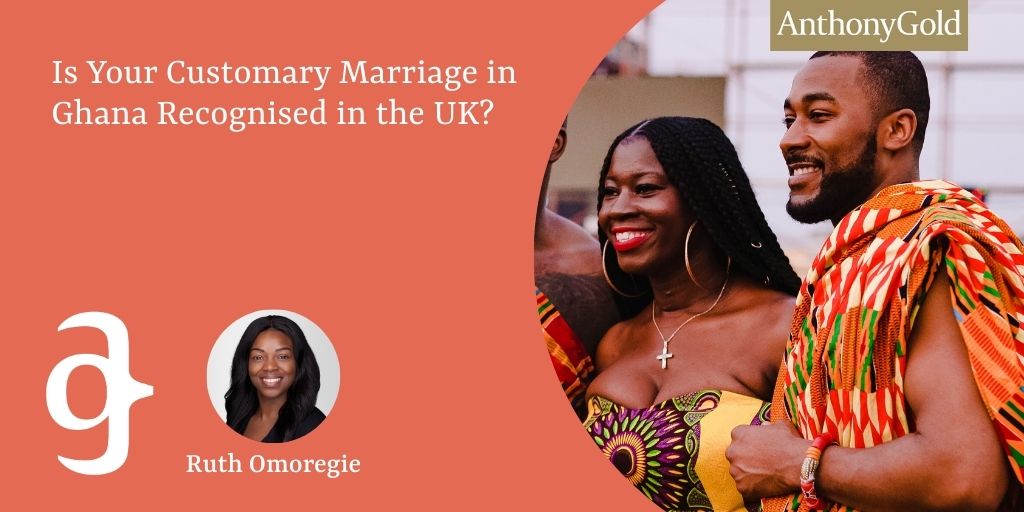Is your customary marriage in Ghana recognised in the UK?


A customary marriage may be defined as a marriage contracted in accordance with the applicable customary laws of the parties to the marriage. If you had a customary marriage in Ghana, also often referred to as a ‘traditional wedding’, you might wonder if your marriage is formally recognised in England and Wales.
Ghanaian weddings are full of beautiful traditions that mean a lot back home. But when it comes to getting your marriage recognised here, there are a few hurdles you might face. This blog seeks to explain what you need to know in simple terms, to help you make sure that your marriage is recognised in this jurisdiction.
Understanding Ghanaian Customary Marriages
In Ghana, customary marriages have their own essential features that determine their validity, which differ from the formalities required in a civil marriage. Traditional weddings are rich with customs, from family discussions and giving a bride price (a gift to the bride’s family), to big celebrations with dancing and special attire. These are important in Ghana but do not always align with the formal marriage requirements in England and Wales.
In the case of Yaotey v Quaye [1961] 2 GLR 573, customary marriage was defined as marriage between two families. Justice Ollennu set out what he perceived to be the four essential requirements of a valid customary marriage, which are as follows:
- Agreement by the parties to live together as husband and wife;
- Consent of the family of the man that he should have the woman to be his wife (such consent may be implied from conduct);
- Consent of the family of the woman that she should be joined in marriage to the man (such consent is indicated by the acceptance of a drink from the man or his family, or implied from conduct);
- Consummation of the marriage i.e. that the man and woman are living together in the sight of the world as man and wife.
The question of whether a customary marriage is assessed on whether the customary requirements needed to validate the marriage were met. For example, the marriage ceremony must be celebrated in the presence of witnesses and there must be presentation of a dowry, to be accepted by the bride’s family.
Section 31 (1) of the Evidence Act, NRCD 323 (1975) specifically states that:
“A marriage which has been celebrated before witnesses is presumed to be valid”.
This is applicable to both monogamous and polygamous marriages.
Key Aspects of Ghanaian Customary Marriages and UK Recognition Challenges
There are many different tribes in Ghana, and they each have their unique customary marriage traditions. Below we highlight only a few key aspects, which may vary for some tribes.
Verbal Consent and Agreement
A unique aspect of some Ghanaian customary marriages is that verbal consent and agreements between the families, or even between the couple, can be enough to signify a legal marriage. This contrasts sharply with the law in England and Wales, which requires a formal marriage ceremony, following which the marriage be officially registered and documented. However, registration of a customary marriage is not mandatory in Ghana. The non-registration of a customary marriage does not detract from the validity of the marriage itself.
In England and Wales, you can decide whether to have a religious ceremony or a civil ceremony. All religious ceremonies must take place at a registered religious building and must be conducted by an authorised person, who must sign the marriage certificate. A civil ceremony can take place at a register office or other approved venue, must have at least two witnesses present and must be conducted by a registrar. In both types of ceremonies, the parties must exchange vows and can include an exchange of other wording, which should be discussed in advance with the person conducting the ceremony. Civil ceremonies, like religious ceremonies, can include readings songs or music, but must not include anything that is religious, such as hymns or readings from any holy book.
For all legally recognised ceremonies the married couple must be given a marriage certificate.
Community Recognition
In Ghana, the acceptance and recognition of a marriage by the community and the families involved can be enough to consider a couple legally married under customary law. However, in the England and Wales, societal or community acknowledgment of a marriage does not equate to legal recognition.
Dowry or Bride Price
In Ghana, marriage often begins with negotiations between the families of the bride and groom, culminating in the payment of a bride price or dowry. This is a revered tradition, symbolising respect, and commitment. However, in the England and Wales, marriage laws do not recognise such practices as part of the legal process of getting married. The focus is on the mutual consent of the individuals getting married, without any requirement for family agreements or financial transactions related to the marriage.
Symbolic Rituals and Ceremonies
Ghanaian weddings are known for their elaborate rituals and ceremonies, which carry deep cultural significance. These can include pouring libations, performing traditional dances, and wearing special cultural attire. While these rituals are a beautiful expression of Ghanaian culture and heritage, they differ significantly to the formal marriage ceremony in England and Wales. The cultural practices of a Ghanaian wedding, though respected, are not in themselves sufficient for a marriage to be legally recognised in the UK.
Polygamy
Polygamy is accepted and practiced within some tribes in Ghana, where a man can legally marry more than one wife. This practice is recognised under Ghanaian customary law. However, the legal framework in England and Wales does not recognise polygamous marriages as legally valid.
In the England and Wales, marriage is defined as a union between two individuals only, emphasising monogamy. Therefore, even if a polygamous marriage is legally recognised in Ghana, it would not be considered legally valid in this jurisdiction.
Why Legal Advice is Helpful
Getting your Ghanaian marriage recognised in England and Wales might seem like a big task, but it is possible with the right information and help. The rules about marriage recognition can be tricky, so getting help from a legal expert is highly recommended. We can help you understand what you need to do and provide support advice and guidance in complex proceedings. For advice tailored to your situation, contact the Family team at Anthony Gold Solicitors, where we can work together and reach a desirable outcome.
As an introduction to our team we offer a fixed fee consultation at a reduced rate of £300 inclusive of VAT to new clients. This can be remote or in person whatever suits you best. There is no obligation to instruct after the meeting or incur any further costs.
Please note
The information on the Anthony Gold website is for general information only and reflects the position at the date of publication. It does not constitute legal advice and should not be treated as such. It is provided without any representations or warranties, expressed or implied.

Related Insights
- April 29, 2024
Is Your Nigerian Traditional Marriage Recognised in the UK?
Our Latest Family & Relationships Insights
- October 27, 2025
Divorcing when assets are modest
- October 17, 2025
What happens if parents disagree on vaccinations? A UK family law guide
- September 16, 2025
Virtual hearings in Family Law: How to prepare & present yourself
- August 22, 2025
How do you legally end a civil partnership?
- August 22, 2025
How English judges decide the finances on divorce – and what Standish v Standish means for you
- August 21, 2025
What are the legal implications of digital abuse in family law in the UK?
Related Guides
- August 19, 2025
Getting It Right from the Start: What to Expect from Your First Meeting with a Family Solicitor
- April 17, 2025
Family mediation: What is it & how can it help?
- March 11, 2025
Comprehensive Guide to Postnuptial Agreements
Latest Articles
View allGuide: November 7, 2025
Guide: November 7, 2025
Guide: November 6, 2025
Contact the Conveyancing team today
Contact us today
"*" indicates required fields
Contact the commercial
& civil Dispute team today
"*" indicates required fields
Contact the Conveyancing team today
Contact the Conveyancing team today
Contact the Wills, Trusts
& Estates team today
Contact the Court of
Protection team today
Contact the Employment Law team today
Contact the Clinical Negligence team today
Contact the Family & Relationships team today
Contact the Personal Injury Claims team today
Contact the leasehold & Freehold team today
Contact the Corporate & Commercial team today
Contact the housing & disputes team
"*" indicates required fields














